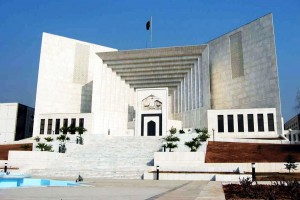Supreme Court of Pakistan: While discussing the issue of achieving city wide uniformity in installation of billboards and hoardings in the city of Karachi, the three judge bench of Mian Saqib Nisar, Amir Hani Muslim and Khilji Arif Hussain, JJ., directed that no billboards and hoardings must be erected on a public property by any authority under the garb of by-laws which militate the civil rights of the public at large. The Bench further observed that “civil rights of the citizens cannot be hampered with by erecting the Billboards or Hoardings on the civic amenity meant for the use and benefit of public at large besides such an act would endanger the life and property of the common man.”
In the present case regarding Report of Karachi Cantonment Board regarding Hoardings and signboards installed with permission and without permission, the Bench considered that there are no laws which permit the Karachi Metropolitan Corporation and the Cantonment Boards to install billboards or hoardings on a public property. Such an act on the part of permission granting agency is against the civil rights of the citizens.
The Bench further gave directions that the billboards/hoardings which have been installed on the public properties under any license or lease are to be uprooted by 30-06-2016 by the concerned advertising agencies which own the poles or displaying materials or by the authorities with whose permission the billboards or hoardings have been installed. The Court also directed the Additional Attorney General to hold meetings with all the stakeholders who grant permission for installation of such billboards/hoardings in Karachi in order to finalize the amendments in the by-laws so that city-wide uniformity could be achieved thereby ensuring the safety measures of the citizens of Karachi. [Report of Karachi Cantonment Board regarding Hoardings and signboards installed with permission and without permission, CMA No.209-K of 2014, decided on 05.05.2016]

